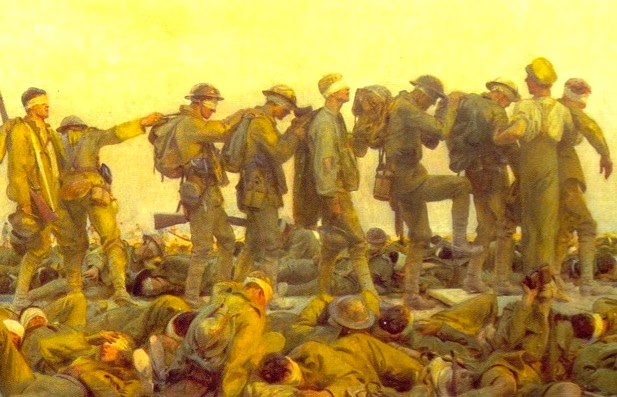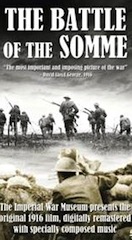
| |
Cinematographers: John McDowell and Geoffrey Malins, 1916
When this silent battlefield documentary was released in 1916 it is estimated that more than 20 million tickets were sold in the first two months alone. The film was then distributed internationally to demonstrate Britain's commitment to victory in the war. It has become one of the most successful British films ever made and the source of many of the war's most iconic images (though a few scenes were staged). In 2005 it became the first British document ever inscribed in UNESCO's "Memory of the World" register.
© Trustees of the Imperial War Museums
|
|
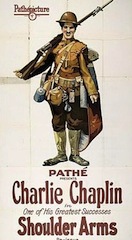
| |
Director: Charlie Chaplin, 1918
This silent film follows Charlie Chaplin's famous tramp character from his first days as a US Army recruit in boot camp to his harrowing adventures behind enemy lines on the Western Front. Chaplin's famous brand of physical comedy and clownish naïveté somehow manage to portray well the drudgery and horrors of trench life without trivializing the terrible human cost. Released less than a month before the armistice, the film was a commercial and critical success.
© Pathé Films
|
|
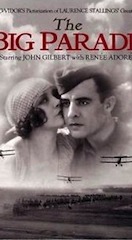
| |
Director: King Vidor, 1925
This extraordinary silent film tells the story of James Apperson, the idle son of a rich businessman, who joins the army to please his family and fiancée when the United States enters the war in April 1917. James is sent to France, where before being sent to the front he becomes friends with two working-class soldiers and falls in love with a Frenchwoman. This groundbreaking film heavily influenced all subsequent war films, including All Quiet on the Western Front (1930) and Grand Illusion (1937). © MGM
|
|
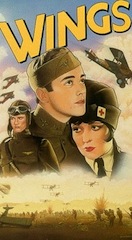
| |
Director: William Wellman, 1927
This action-romance silent film tells the story of two American pilots serving on the Western Front who vie for the love of the same woman. The director, William Wellman, had been a combat aviator during the war and his recreation of the Battle of St. Mihiel in the air and on the ground is incredible. Released in the same year that the Academy Awards began, this was the first film to win Best Picture. Praised for its realism and technical sophistication, for decades it set the standard against which all other aviation films were judged. © Paramount
|
|
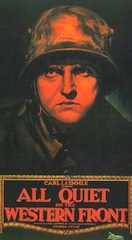
| |
Director: Lewis Milestone, 1930
This film follows a group of German schoolboys talked into enlisting at the beginning of the war by their jingoistic teacher. The story is told entirely through the experiences of the young recruits and highlights the tragedy of war through their eyes. As the boys witness devastation and death all around them, any preconceptions about the inhumanity of their enemy and the moral justification of the war disappear, leaving them angry and confused. Adapted from the classic 1929 novel by war veteran Erich Maria Remarque. See also the award-winning 2022 remake. © Universal Pictures
|
|
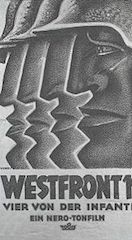
| |
Director: G.W. Pabst, 1930
This film, which was part of the Neue Sachlichkeit ("New Objectivity") movement in interwar German cinema, chronicles the experiences of four German infantrymen in the trenches during final months of the war. The film was popular with German audiences when it was released in 1930 but was later denouced by the Nazi government for its pacifist message and depictions of wartime poverty and low morale. Based on the novel by Ernst Johannsen.
© Criterion
|
|
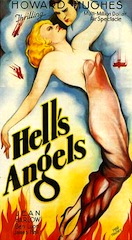
| |
Director: Howard Hughes, 1930
The story of three Oxford schoolmates, two English brothers and one German, who are later conscripted to fight on opposite sides of the war. Billionaire aviation pioneer Howard Hughes produced and directed Hell's Angels, the most expensive film ever made in its time. He spared no expense in capturing every detail of the air war. In one scene alone he reenacted a massive dogfight between British and German fighter planes, using 137 pilots in all.
© Universal
|
|
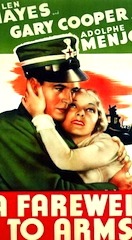
| |
Director: Frank Borzage, 1932
This melodramatic film tells the story of a love affair between Frederic Henry, an American serving in the Ambulance Corps of the Italian Army, and Catherine Barkley, an English nurse. The 1929 novel, on which this film is based, was Ernest Hemingway's first bestseller and helped secure his reputation as one of the great modern American writers. The novel and film were drawn from Hemingway's own experiences during the war as a volunteer on the Italian front.
© Paramount
|
|
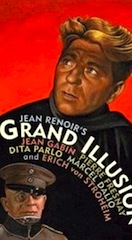
| |
Director: Jean Renoir, 1937
Considered a masterpiece of French cinema, this film focuses on the interaction among French army officers taken as prisoners of war and their German captors. The men, who are divided along lines of class and religion as well as nationality and politics, find that their common humanity experienced through daily life in the POW camp transcends whatever boundaries separate them both in wartime and civilian life.
© Criterion
|
|
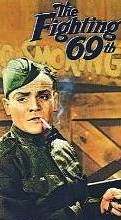
| |
Director: William Keighley, 1940
The 69th Infantry Regiment from New York, composed largely of Irish Americans, had a legendary reputation dating back to the Civil War. This film tells the story of the heroism and leadership
of the regiment's chaplain, Rev. Francis Duffy, during some of the most brutal campaigns of the First
World War. Father Duffy was one of three men of the 69th awarded the Medal of Honor and the regiment
became the inspiration for the Notre Dame University nickname "The Fighting Irish." © Warner Bros.
|
|
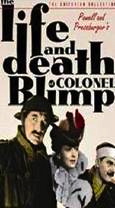
| |
Directors: Michael Powell and Emeric Pressburger, 1943
This film chronicles the life of Gen. Clive Wynne-Candy, an upper-class British Army officer, from his dashing youth as a hero of the Boer War until his being called out of retirement during World War II. Wynne-Candy meets Theo Kretschmar-Schuldorff, a German officer, in the years before World War I when the two men become unlikely friends after a duel. They are reunited when Theo is a POW in Britain. The demise of the pre-war notions of honor that characterize both men brings them closer together. © Criterion
|
|
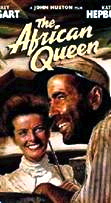
| |
Director: John Huston, 1951
This classic film starring Humphrey Bogart and Katherine Hepburn is set in German East Africa
(present-day Tanzania) at the start of the war. The story focuses on the
relationship that develops between a prim missionary (Hepburn) and the crotchety steamboat
captain (Bogart) hired to transport her to safety after the war breaks out. Based on the
1935 novel by C.S. Forester.
© Horizon Pictures
|
|

| |
Director: Karel Steklý, 1956
This Czech anti-war comedy follows the misadventures of Josef Švejk, a private in the Austro-Hungarian army. Seemingly idiotic and incompetent, Švejk repeatedly manages to frustrate military authority and expose its stupidity and the absurdity of his circumstances. All the while it remains unclear if he is genuinely incompetent or acting deliberately. Based on the unfinished 1923 satire by Jaroslav Hašek, drawn from his own wartime experiences. It is the most widely translated Czech novel.
© Filmové Studio Barrandov
|
|
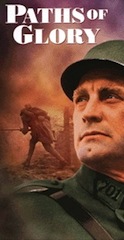
| |
Director: Stanley Kubrick, 1957
A callous and ambitious French general orders his officers to lead their men in a suicidal assault against heavily defended German lines. After the inevitable slaughter of the attacking soldiers, the general orders his artillery to shell the area between the remaining soldiers and their own trenches to prevent a retreat to the protection of their own lines. The artillery commander refuses to carry out the order. To cover up the confrontation the general demands that three soldiers be charged with cowardice and executed. Based on the 1935 book by Humphrey Cobb. © MGM
|
|
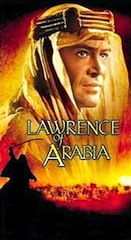
| |
Director: David Lean, 1962
This is a classic film about T.E. Lawrence, a young officer assigned
to the British Foreign Office in Cairo during the First World War.
Lawrence is given the task of riding into the Arabian Desert to
unite the various Bedouin tribes against the Turkish forces (which
are allied with Germany). The film is a highly romanticized portrayal
of Lawrence's campaign and has been the subject of much controversy
among historians and cultural critics. Based loosely on Lawrence's 1922
memoir Seven Pillars of Wisdom.
© Columbia/TriStar
|
|
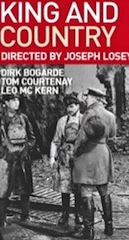
| |
Director: Joseph Losey, 1964
In the British trenches at Passchendaele, an army private, Arthur Hamp, leaves his company and is accused of desertion. He is defended at his trial by Capt. Hargreaves, an upper-class officer who is initially contemptuous of the simple-minded Hamp but comes to identify with his plight. Nevertheless Hamp must be made an example of. He is found guilty and is shot by a firing squad. The action is confined to the muddy, rat-infested trenches and barracks. Based on the 1955 novel by J.L. Hodson. © VCI Video
|
|
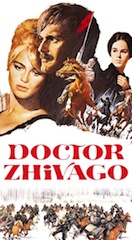
| |
Director: David Lean, 1965
One of the great films of all time. Through a series of flashbacks the story unfolds of Yuri Zhivago, a Moscow physician and poet, and his enduring love for Lara, a beautiful and enigmatic woman who he meets in his youth. The tumultuous lives of Yuri and Lara unfold against a dramatic historical backdrop that includes vivid portrayals of the war on the Eastern Front, the Russian Revolution, and the Russian Civil War. Based on the 1957 novel by Russian dissident Boris Pasternak.
© MGM
|
|
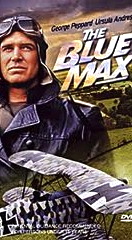
| |
Director: John Guillermin, 1966
In 1918, Lt. Bruno Stachel arrives at a German fighter squadron on the Western Front. Because of his lower-class background and former enlisted service in the trenches, he struggles to fit into the exclusionary aristocratic culture of his fellow aviators. To gain acceptance he becomes obsessed with shooting down twenty enemy aircraft and winning Germany’s highest military award, the coveted "Blue Max." A mediocre war story in most respects, the film is redeemed by its spectacular aerial photography and stunt flying. Based on the 1964 novel by Jack Hunter.
© Twentieth Century Fox
|
|
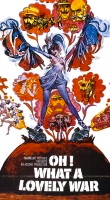
| |
Director: Richard Attenborough, 1969
An unlikely musical satire about the "game of war" as portrayed by the leaders of the great powers and the members of an average British family, the Smiths, who go off to fight. Much of the plot is conveyed in the lyrics of actual songs from the period and many scenes recreate some of the more famous (and infamous) incidents of the war. A mocking comedy about the jingoism, cynical politicking, and wartime enthusiasm that sent so many to die. Based on the 1963 stage musical of the same name.
© Paramount
|
|
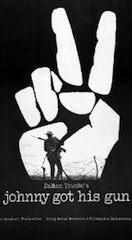
| |
Director: Dalton Trumbo, 1971
A young American soldier, hit by an artillery shell and grievously injured on the last day of the war, lies in a hospital bed as a quadruple amputee who has also lost his eyes, ears, mouth and nose. He remains conscious and able to think, thereby reliving his past through strange dreams and memories, but unable to distinguish whether he is awake or dreaming. Based on the 1938 novel by the director, Dalton Trumbo, this is both an anti-war statement and a horror film.
© World Entertainment
|
|
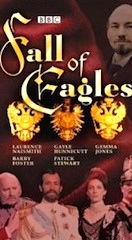
| |
Creator: John Elliot, 1974
This BBC series portrays the downfall of the three great
dynasties of Continental Europe: the Hohenzollerns of Germany, the Habsburgs of Austria,
and the Romanovs of Russia. The series begins in the late nineteenth century and traces
family relationships alongside national and international politics through the end of
the war in 1918. Faithful to historical accuracy, it offers interesting character
studies (Patrick Stewart plays Lenin in a breakthrough performance).
© BBC
|
|
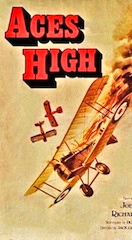
| |
Director: Jack Gold, 1976
This film depicts one week at a squadron of the Royal Flying Corps stationed along the Western Front. The squadron commander, Major John Gresham, leads his inexperienced pilots in combat and struggles to maintain unit morale amid appalling casualties and high turnover. The casualty rate among rookie pilots of the RFC, from accidents and enemy action, was among the highest of any branch of the service in this war. Based on the 1928 play Journey’s End by combat veteran R.C. Sheriff.
© Cine Artists Pictures
|
|
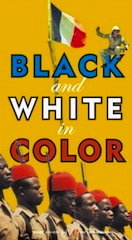
| |
Director: Jean-Jacques Annaud, 1976
In 1914, colonial officials in French Equatorial Africa find themselves at war with their German neighbors. Deciding that they must do their patriotic duty and fight, they promptly conscript the local population. Issuing them boots and rifles, the French attempt to make "proper" soldiers out of the Africans. This French satire on racism,
imperialism, and patriotism is one of the few films about the First World War to focus on the experience in Europe's colonies.
© Homevision
|
|
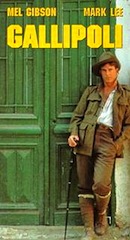
| |
Director: Peter Weir, 1981
In 1915, Archy and Frank meet at a sprinting competition in Western Australia and decide to join the Australia and New Zealand Army
Corps (the "ANZACs"). A few months later they land at Gallipoli on the Turkish coast and participate in one of the most disastrous
British campaigns of the First World War. This is one of the best
film portrayals of the horrors of war and the waste of young lives.
It also gives insight into a distinctly anti-British sense of Australian
nationalism that arose after this war.
© Warner Home Video
|
|
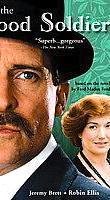
| |
Director: Kevin Billington, 1981
In the decade before the First World War, two wealthy and attractive upper class couples—one English, one
American—meet at a German spa and forge an immediate bond. Through nine seasons at the spa, the four
come to share with each other their same tastes, desires, and elegantly perfect Edwardian lives. Over
time, however, it becomes clear just how far short of perfection their lives really are. Based on the
1915 semi-autobiographical novel by Ford Madox Ford.
© Acorn Media
|
|
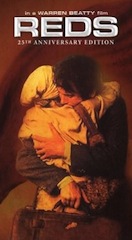
| |
Director: Warren Beatty, 1981
This film focuses on John Reed, an American journalist and communist organizer, and his wife Louise Bryant, a feminist writer. After years of anti-war and socialist activism in America, Reed and Bryant traveled to Russia in 1917 to witness the Bolsheviks seize power and establish the world's first communist state. Based on Reed's first-hand account of the October Revolution, Ten Days that Shook the World, the film is interspersed with interviews of surviving friends and colleagues of Reed and Bryant.
© Paramount
|
|
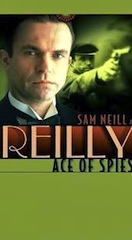
| |
Directors: Martin Campbell and Jim Goddard, 1983
This television series dramatizes the extraordinary life and exploits of Sidney Reilly, Britain's first
modern super-spy. With his remarkable gift for self-invention and reinvention, Reilly engaged in
freelance espionage against the Germans and Russians from the pre-war Anglo-German rivalry to the
years after the Russian Revolution.
His resourcefulness, self-confidence, and incorrigible womanizing were later the
inspiration for Ian Fleming’s master spy, James Bond.
© A&E Home Entertainment
|
|
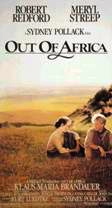
| |
Director: Sydney Pollack, 1985
The true story of Baroness Karen Blixen-Finecke, a Danish woman
who relocated to the British East Africa Protectorate (Kenya) with her husband
in 1914 to take charge of a large coffee plantation. Part of the film portrays the chaotic fighting in the highlands of East Africa between British and German settlers and the thousands of African porters they conscripted. Based on Blixen's 1937
autobiographical account written under the pen name "Isak Dineson."
© Universal
|
|
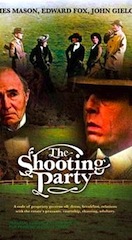
| |
Director: Alan Bridges, 1985
In the summer of 1913 a small group of English lords and ladies gathers at the country estate of Sir Randolph Nettleby for a shooting party. A code of aristocratic propriety governs every aspect of the event—including speech, dress, dining, interaction with the estate's tenants, courtship, shooting, and even adultery. A vivid portrayal of a way of life that on the eve of the First World War was already in the midst of an irreversible decline.
© Jef Films
|
|
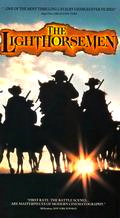
| |
Director: Simon Wincer, 1987
Set in Palestine in 1917, this epic film tells the true story of how the 4th
Australian Light Horse Brigade breached the Turkish defenses running from Gaza
to Beersheba. The little-known “Battle of Beersheba” ended in one of the last
successful cavalry charges in history and was a much-needed boost for British
and imperial morale after the disastrous defeat at Gallipoli two years earlier.
This lavish Australian film received little attention internationally but was
extremely popular with home audiences. © RKO Pictures
|
|
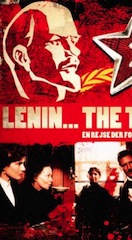
| |
Director: Damiano Damiani, 1988
In February 1917, the Czar of Russia is forced to abdicate and a provisional government takes power. A month later, a sealed train with Russian exiles passes through Germany to the North Sea and another train continues through Sweden and Finland bound for Petrograd. Aboard these trains is V.I. Lenin returning home to lead a socialist revolution. This film, set during the long train journey, revolves around Lenin's politics and personal life as he prepares for the fulfillment of his revolutionary vision. Based on the 1975 book The Sealed Train by Michael Pearson.
© Bridge Entertainment Group
|
|
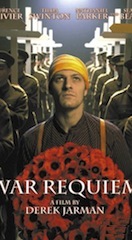
| |
Director: Derek Jarman, 1988
With no spoken dialogue, this strange film is a panorama of visual images set to the music and lyrics of Benjamin Britten's War Requiem, Op. 66, (1962) and interspersed with verses from Wilfred Owen's poems reflecting the horrors of the Great War. Made in the 1980s and very much a product of its time, this experimental film seems to be an attempt at a music video of Britten's famous composition and an antiwar statement, more broadly. It also contains Laurence Olivier's last acting role in any medium.
© BBC
|
|
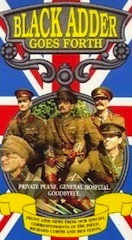
| |
Director: Richard Boden, 1989
The fourth and final season of the BBC historical sitcom Black Adder is set in 1917 on the Western Front. This is a somewhat dark subject for a comedy and was a risky project for all involved. Yet the series succeeds in using humor to underscore the terrible conditions of the trenches, stunning incompetence of the leadership, and futile loss of life among the men. The final episode is particularly moving and gives a good sense of how the British view this war.
© BBC
|
|
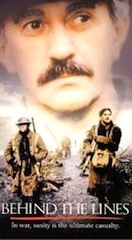
| |
Director: Gillies MacKinnon, 1998
Set in 1917 in an army sanitarium in Scotland, this film focuses on the psychiatric
treatment of shell-shocked soldiers from the Western Front. The patients being treated
range from the catatonic, amnesiac, and deranged to sane war heroes like the poet Siegfried
Sassoon who is being punished for his anti-war pamphlets. A moving film with dialogue
interspersed with voiced-over selections from the best-known verses of the British War Poets. Based
on Pat Barker's 1991 novel and true events.
© Lions Gate
|
|
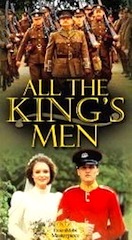
| |
Director: Julian Jarrold, 1999
At the outbreak of war in 1914 a company of the Norfolk Regiment was formed from staff members at the royal estate in Sandringham. A year later the regiment suffered heavy losses at Gallipoli and, during confusion of battle, the Sandringham Company advanced behind Turkish lines and disappeared in the smoke and mist. This film recreates the efforts by the Queen Mother, Alexandra, after the war to learn the fate of her soldier servants.
© BBC Films
|
|
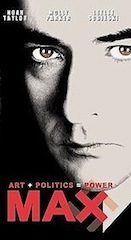
| |
Director: Menno Meyjes, 2002
This film, set in Munich in 1919, portrays the strange relationship between Max Rothman, a Jewish art dealer and one-armed war veteran, and a desperate aspiring artist from Austria named Adolf Hitler. Rothman's astute eye for postwar avant-garde art makes his opinion widely sought out by collectors while a frustrated and embittered Hitler languishes on the margins of the art world. Rothman takes pity on Hitler as a fellow veteran of the trenches but Hitler's immersion in right-wing politics and anti-Semitic propaganda takes his artistic vision in a new direction.
© Lions Gate
|
|
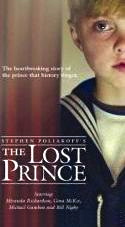
| |
Director: Stephen Poliakoff, 2003
The heartbreaking true story of Prince John, youngest child of King George V and
Queen Mary of England. John's short and sad life spanned from the pomp of the Edwardian court through the turmoil of the First World War. A loving, insightful, and humorous child, John suffered from epilepsy and
autistic-like learning difficulties. Though isolated from public view, he remained an eyewitness to the
politics within the German, Russian and British monarchies that were all part of the same extended family.
© BBC Films
|
|
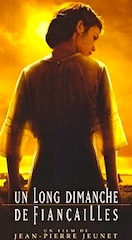
| |
Director: Jean-Pierre Jeunet, 2004
Five desperate French soldiers during the Battle of the Somme disfigure themselves in order to be invalided back home. After they are caught a court martial banishes them to No Man's Land with the objective of having the Germans finish them off. As the plot unfolds each man's life is briefly explored along with their next of kin as Methilde, fiancée to one of the men, tries to determine the circumstances of her lover's death. Based on the 1991 novel by Sébastien Japrisot.
© Warner Bros.
|
|
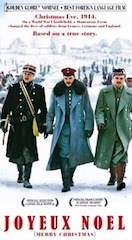
| |
Director: Christian Carion, 2005
A moving and uplifting film about the famous "Christmas truce" in December 1914 during which French, German and British soldiers unofficially exchanged greetings and songs and even visited each other's trenches bearing gifts. Such expressions of common humanity were less frequent later in the war as the scale of death and destruction increased and as punishments from commanders for such fraternization became more severe.
© Sony Pictures Home Entertainment
|
|
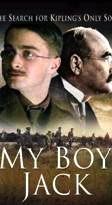
| |
Director: Brian Kirk, 2007
At the start of the war, famed author Rudyard Kipling uses his influence to
get his physically unqualified son, Jack, a commission in the Irish Guards. Jack's
deployment to France may be the fulfillment of the elder Kipling's patriotic dream but
it is a nightmare for Jack's mother and sister. When Jack is reported missing after
the Guards suffer terrible losses, Mrs. Kipling forces her husband to use his influence,
once again, to discover the fate of their son. Based on the 1997 play by David Haig.
© Ecosse Films
|
|
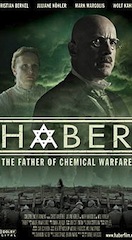
| |
Director: Daniel Ragussis, 2008
In 1914, Fritz Haber was Germany's greatest chemist. The Nobel Prize winner's synthetic fertilizers had saved millions from starvation. Yet as war broke out across Europe and quickly degenerated into a bitter struggle of attrition, the desperate German high command asked Haber to invent an entirely new kind of weapon. Haber's decision not only unleashed weapons of mass destruction for the first time in history, but also threatened to destroy his family as well.
© Cinespire Entertainment
|
|
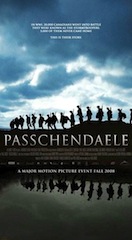
| |
Director: Paul Gross, 2008
The plot of this Canadian film follows Michael Dunne, a troubled veteran returning to Alberta to recover from his wounds after decorated service in the Battle of Vimy Ridge. Dunne begins a relationship with a young nurse and reenlists. He returns with the 10th Battalion of the Canadian Expeditionary Force to fight in the Battle of Passchendaele in fall of 1917. Though a bit melodramatic, the film portrays well Canada’s significant contribution to the Allied war effort.
© Rhombus Media
|
|
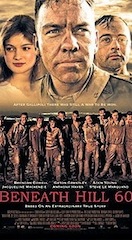
| |
Director: Jeremy Sims, 2010
The story of the 1st Australian Tunneling Company's effort to mine beneath a German bunker in the Ypres Salient at the start of the Battle of Messines in June 1917. Their extremely perilous mission was to detonate an enormous explosive charge to aid the advance of British troops. The screenplay is based on an account of the ordeal written by Capt. Oliver Woodward, the officer who led the mission.
© Paramount
|
|
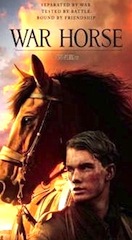
| |
Director: Steven Spielberg, 2011
Albert, a young Welshman, joins the British Army to search for his beloved horse sold to the cavalry by his impoverished family. The horse, a spirited brown stallion, takes part in cavalry charges and endures brutal treatment hauling heavy artillery for the Germans after his rider is killed. The film offers a gripping view of the conditions on the Western Front and particularly the cruel fate suffered by thousands of war horses. Based on the 1982 novel by Michael Morpurgo and the stage play of the same name. © DreamWorks SKG
|
|
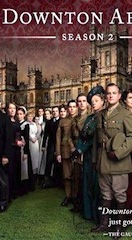
| |
Creator: Julian Fellowes, 2011
The second season of this acclaimed series revolves around the lives of the Crawleys, an aristocratic English family, as they live through and confront the social and political changes brought about by the Great War. Traditional class sensibilities are challenged when Downton Abbey, their country estate, is transformed into a convalescent home for wounded officers while the younger generation of the family and their house servants go to serve as soldiers and nurses.
© Carnival Films
|
|
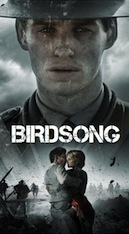
| |
Director: Philip Martin, 2012
This romance, told in a series of flashbacks, focuses on the experiences of Stephen Wraysford, a young Englishman who travels to Amiens in 1910 and has an affair with the wife of a French colleague but returns home shortly afterward. A few years later, Wraysford is deployed to the Western Front as an officer in a combat mining battalion. Amid his near-death experiences in battle he discovers the fate of his lost love. Based on the 1993 novel by Sebastian Faulks.
© Working Title Productions
|
|
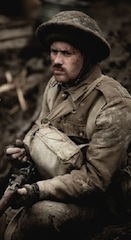
| |
Director: David Roddham, 2012
This moving short film follows two cousins from Northern Ireland who in 1917 volunteer for service in the army and are plunged into the hellish fighting along the Western Front. The brutality of combat and life in the trenches is matched by the callous indifference of the military leadership toward their soldiers suffering from shell shock and the manner in which punishment is dealt out. Twenty-six Irish-born soldiers in the British Army were executed for cowardice in the First World War. They were not officially pardoned until 2006.
© Different Productions
|
|
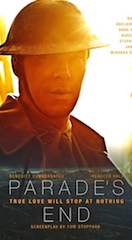
| |
Director: Susanna White, 2012
This lavish television series focuses on Christopher Tietjens, a young British aristocrat and army officer, and his experiences amid the horrors of the trenches and the social change occurring on the home front. Much of the plot revolves around a love triangle involving Tietjens' vindictive wife Sylvia and a young suffragette named Valentine. Based on the four novels by Ford Madox Ford published between 1924 and 1928.
© BBC Worldwide/HBO
|
|
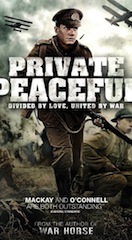
| |
Director: Pat O'Connor, 2012
This film traces the gritty rural lives of Tommo and Charlie, two young brothers, and their poor Devonshire family from 1908 until the outbreak of war in 1914 destroys their country idyll. Both join up (one underage) and deploy to the Western Front where they survive gas attacks, shelling, and the grisly deaths of their close friends. Yet one thing they cannot escape is the unforgiving hand of military justice. Based on the 2003 young adult novel by Michael Morpurgo.
© Eagle Rock Entertainment
|
|
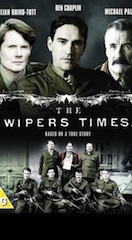
| |
Director: Andy De Emmony, 2013
In 1916, Fred Roberts, a British captain, discovered a printing press in the ruins of Ypres. Soon after, he and a few of his fellow officers began to publish The Wipers Times (a play on the British nickname for Ypres). This satirical magazine, produced under enemy fire and gas attacks, was filled with poetry, jokes, editorials, and even fake ads. The dark, subversive humor of The Wipers Times was enormously popular with the troops and helped boost their morale. The magazine was published until the end of the war and edited collections are still in print.
© Trademark Productions
|
|
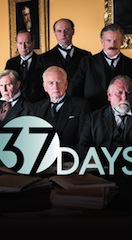
| |
Director: Justin Hardy, 2014
This BBC miniseries covers the period in the summer of 1914 from the assassination of Archduke Franz Ferdinand on June 28 to Britain's declaration of war on Germany on August 4. The series was made to challenge long-held assumptions about the war's inevitability. The writers and producers compiled a 175-page transcript of government documents, diplomatic communications, private letters, and telegrams before writing the script.
© BBC
|
|
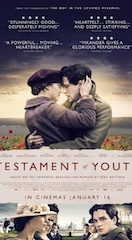
| |
Director: James Kent, 2014
A coming-of-age story about Vera Brittain, an Oxford student and aspiring young writer, in the years before and during the war. As her brother, fiancé, and male schoolmates go off to fight, Vera joins the VAD (Volunteer Aid Detachment) and serves as a nurse in London, France, and Malta. The story follows Vera’s transformation as she and her generation move gradually from a life of comfort and privilege to one of hardship and sacrifice. Based on Brittain's acclaimed memoir from 1933.
© BBC Films
|
|
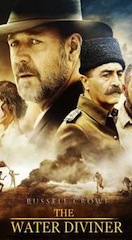
| |
Director: Russell Crowe, 2014
In 1919, Connor, an Australian farmer, travels to Turkey in search of his three missing sons, last known to have fought in the bloody Battle of Gallipoli. Arriving in Istanbul, Connor is thrust into the reality of his country's former enemy where he encounters Turkish families who have suffered their own terrible losses and whose country is in the midst of a tumultuous transition from an antiquated empire to a modern republic. This film was released to coincide with the centenary of the start of the Dardanelles campaign, a major event in Australia.
© Warner Home Video
|
|
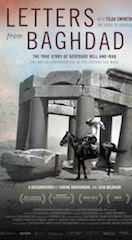
| |
Directors: Sabine Krayenbühl and Zeva Oelbaum, 2016
The extraordinary story of Gertrude Bell, CBE (1868-1926), a British adventurer, archaeologist, Arabic linguist and diplomat who helped shape the modern Middle East, particularly Iraq, after the First World War. Bell was as influential as her colleague and friend, T.E. Lawrence, through remains less well known. This documentary, narrated by Tilda Swinton, chronicles Bell's journey into the uncharted Arabian desert and all-male halls of colonial power with never-before-seen archival footage of the region shot a century ago.
© Vitagraph Films
|
|
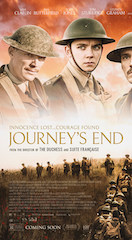
| |
Director: Saul Dibb, 2017
In March 1918 in Saint-Quentin, Aisne, a young British infantry officer, Lt. Raleigh, arrives in the trenches fresh from training and eager to serve under his company commander and former schoolmate, Capt. Stanhope, a war weary veteran suffering the mental strain of his experiences and responsibilities. The story plays out in the officers' dugout over four days during the run-up to "Operation Michael," a major German offensive launched from the Hindenburg Line. Based on the 1928 play by R.C. Sherriff.
© Lionsgate
|
|
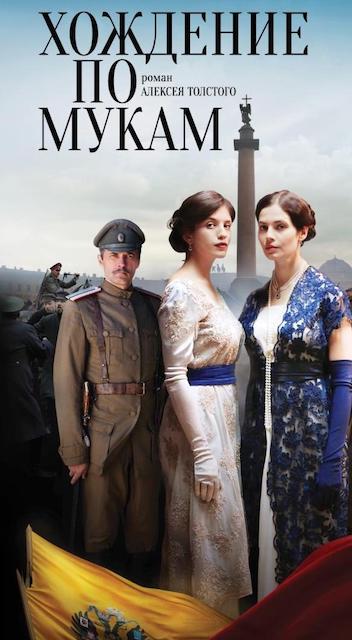
| |
Director: Konstantin Khudyakov, 2017
This Russian TV miniseries focuses on the lives of Dasha and Katya Bulavina, two sisters in an upper middle-class St. Petersburg family whose previously affluent and stable lives are upended by the events of the First World War and the Russian Revolution. The paths of the two women and their friends and lovers in the intelligentsia diverge as they are forced to choose sides between the Whites and Reds during the revolution and the resulting civil war. Based on the trilogy of novels by Alexei Tolstoy.
© World Russian Studios
|
|
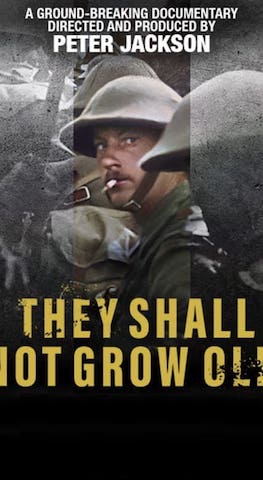
| |
Director: Peter Jackson, 2018
For this documentary, released upon the centenary of the November 1918 armistice, director Peter Jackson was given unlimited access to the film archives of the Imperial War Museum and the BBC, most of it previously unseen. The resulting film, which focuses on the daily lives of the men in the trenches, has been colorized and computer enhanced and augmented with sound effects and voice-overs. It has been praised as a major achievement in film restoration and an immersive and moving tribute to the men who fought in this war.
© WingNut/Imperial War Museum
|
|
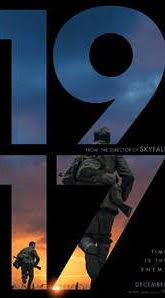
| |
Director: Sam Mendes, 2019
In April 1917, two British soldiers are ordered to deliver a message to the 2nd Battalion of the Devonshire Regiment warning of a planned ambush by Germans who have retreated from their positions to the more heavily defended Hindenburg Line. The men race against time to cross enemy territory and alert a battalion of 1600 men about the trap that awaits them. Based on stories told to the director by his paternal grandfather, Alfred Mendes, a Trinidadian veteran of the war who served in the 1st Rifle Brigade.
© Universal Pictures
|
|
